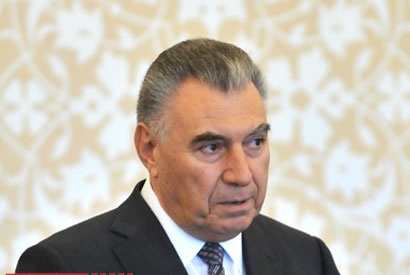Baku, UNICEF talk about drug trafficking in occupied territories

By Sara Rajabova
Azerbaijan and UNICEF discussed fight against drug abuse, illicit drug trafficking, and measures taken in this regard in the country.
Azerbaijani Deputy Prime Minister and Chairman of the State Commission on Combating Drug Abuse and Illicit Drug Trafficking Ali Hasanov received head of the UNICEF office in Azerbaijan Mark Hereward on November 25 in the Cabinet of Ministers.
Hereward was accompanied by his deputy Rashed Mustafa and UNICEF Regional Office senior advisor on AIDS and international expert Nina Ferencic, the state commission reported.
Hasanov informed the guests about the state of drug addiction in the country, the president's attention to the fight against drug abuse and illicit drug trafficking, and measures carried out by the State Commission.
He said that information regarding the cultivation of narcotic plants by the Armenian armed forces in Azerbaijan's occupied territories, production and smuggling of drugs through the occupied territories, etc. is regularly sent to the UN's relevant bodies.
Citing various reasons, Armenia does not allow UN experts to visit the occupied territories, and related organizations do not take the necessary measures either.
Informing the guests about the routes through which drugs are transported from Afghanistan to Azerbaijan, Hasanov said that The Lancet medical journal, published in London, pointed to 300,000 drug addicts in Azerbaijan and that the number of drug users significantly differs from official figures .
He also said that Azerbaijan has repeatedly appealed to the UN relevant bodies to assist in clarifying the number of drug addicts.
The Azerbaijan National Anti-drugs Propaganda Office, acting within the framework of the UN Development Programme (UNDP), said earlier that Azerbaijan's Nagorno-Karabakh region occupied by Armenia has turned into a regional center for drug production and trafficking.
According to the publication, there are facts provided by various sources about drug trafficking through Nagorno-Karabakh, an integral part of Azerbaijan, to neighboring Russia and Europe.
Authors of the research said that drug trafficking in Nagorno-Karabakh brings enormous profits for Armenia, and the funds are spent on financing extremist forces, supporting the armed groups, and purchasing weapons.
The route of drug trafficking through the territory of Nagorno-Karabakh also stands in the way of the settlement to the Nagorno-Karabakh conflict between Armenia and Azerbaijan and adversely affects the security of the entire region.
Azerbaijani officials and representatives of international organizations have repeatedly made well-founded statements about the use of the occupied territories for drug production.
Given the urgency of the problem of controlling illicit trafficking, intensive work is underway in Azerbaijan to establish a legal basis for combating such crimes.
Azerbaijan has joined the 1961, 1971 and 1988 UN conventions on narcotic drugs, psychotropic substances, and fight against illegal circulation of precursors, and concluded bilateral and multilateral agreements and memoranda of understanding with a number of countries on combating drugs.
Besides the three UN conventions, Azerbaijan is party to the Partial Agreement establishing the Pompidou Group of the Council of Europe on cooperation in combating drug abuse and trafficking.
Over 20 percent of Azerbaijan's internationally recognized territory, including Nagorno-Karabakh and seven adjacent regions, has been occupied by Armenian armed forces since a lengthy war between the two South Caucasus countries in the early 1990s. The UN Security Council has passed four resolutions calling for Armenia's pullout, but they have not been enforced to date.
Here we are to serve you with news right now. It does not cost much, but worth your attention.
Choose to support open, independent, quality journalism and subscribe on a monthly basis.
By subscribing to our online newspaper, you can have full digital access to all news, analysis, and much more.
You can also follow AzerNEWS on Twitter @AzerNewsAz or Facebook @AzerNewsNewspaper
Thank you!
